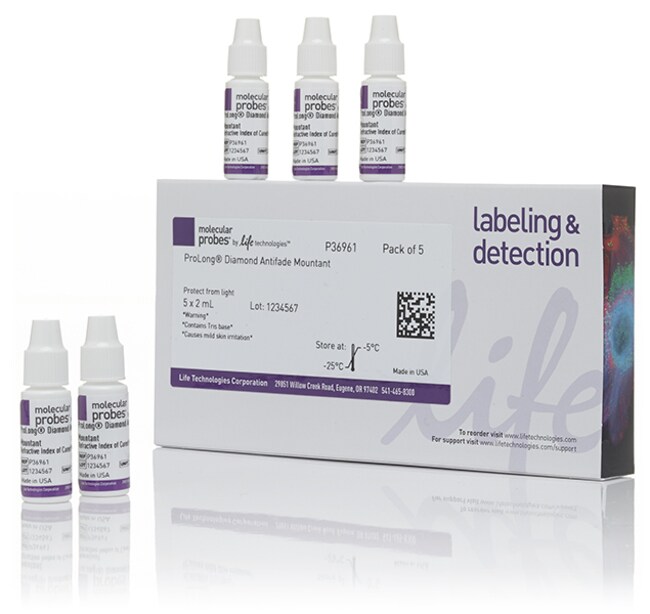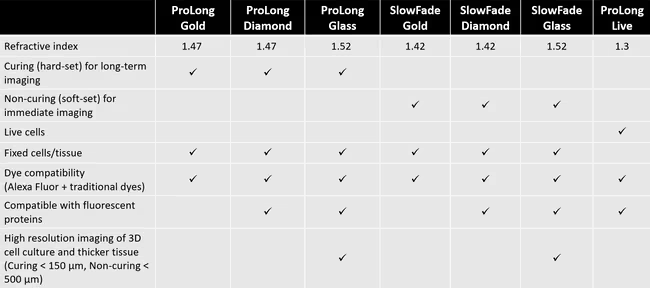
ProLong Diamond Antifade Mountant is a glycerol-based liquid mountant applied directly to fluorescently labeled cells or tissue samples. ProLong Diamond mountant is designed to provide unparalleled antifade protection across the entire visual and IR spectrums. You can use ProLong Diamond mountant with almost any fluorescent dye or fluorescent protein (e.g., GFP, RFP, mCherry) to achieve the brightest signal and lowest background, for bright, high-definition fluorescent images.
ProLong Diamond Antifade Mountant comes mixed and ready-to-use in a 2 mL dropper bottle or 10 mL bottle. Just apply a drop to the sample, add a coverslip, cure, and image. ProLong Diamond mountant does not discolor or shrink when cured, enabling high-quality fluorescent images months after mounting your sample. ProLong Diamond mountant will cure to an RI of 1.47.
Get photobleaching protection across the entire visible and IR spectrums
ProLong Diamond Antifade Mountant’s ability to provide brighter signal, against low background, helps ensure that you get high-resolution images. ProLong Diamond provides superior protection against photobleaching and will not quench your fluorophores. It can be used with an array of fluorescent dyes, including Alexa Fluor dyes, FITC, TRTC, Texas Red, Cy3, and Cy5 or fluorescent proteins. For immediate viewing of the sample without curing, SlowFade Diamond Antifade Mountant is optimal.
Archiving fluorescently labeled samples with excellent RI
ProLong Diamond mountant is the ideal option for archiving samples with fluorescent dyes or fluorescent proteins. Please note that ProLong Glass mountants are recommended for samples > 10 microns and all immersion oil imaging applications. It is also ideal for preserving signal strength during prolonged imaging sessions, such as repeated imaging under confocal laser scanning illumination, or with super resolution microscopy. Additionally, the curing property of ProLong Diamond means you do not need to use traditional acrylic resins (i.e., fingernail polish), which can damage microscope objectives if it comes into contact with them. The refractive index determines how much the path of light is bent, or refracted, when entering a material. In microscopy, refractive index differences between specimen and mounting medium should be minimized and can be reduced by using mountants with a higher RI. Optimizing the RI of your experiment will increase the resolution to provide better quality images. Depending on your sample type, thickness, imaging depth and/or staining reagents (e.g. fluorescent proteins or dyes) and whether you need a curing or non-curing mountant, choosing the right mounting media will impact image resolution and should be strongly considered for optimal experimental design.
| Code | Description |
|---|---|
| P36961 | Catalog Number: P36961 |
| P36965 | Catalog Number: P36965 |
| P36970 | Catalog Number: P36970 |


